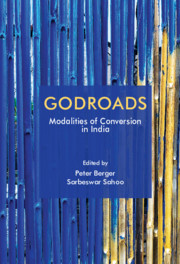Book contents
- Frontmatter
- Contents
- Foreword
- Acknowledgements
- Introduction
- 1 The Rise, Growth and Significance of Shudra Conversion Movements in the Methodist Mission, Hyderabad, 1925–1947
- 2 Communism and the Cross: A Caste–Class Trajectory of Religious Conversion in South India
- 3 Religious Conversion as Ethical Transformation: A Study of Islamic Reformism in Rural West Bengal
- 4 Conversion versus Unity: The Basel Mission among the Badaga on the Nilgiri Plateau, 1845–1915
- 5 Identity Change and the Construction of Difference: Colonial and Postcolonial Conversions among the Sumi Naga of Nagaland, Northeast India
- 6 Conversion to Christianity and Healing: The Naga of Northeast India
- 7 Reshaping the American Evangelical Conversion Narrative in Nineteenth-Century North India
- 8 Cultural Transformations through Performance Arts in Early Twentieth-Century South India
- 9 Reservation and Religious Freedom: Understanding Conversion and Hindu–Christian Conflict in Odisha and Rajasthan
- 10 Rupture and Resilience: Dynamics between a Hindu Reform Movement and an Indigenous Religion in Highland Odisha
- Afterword: India Seen from Amazonia
- About the Contributors
- Index
Afterword: India Seen from Amazonia
Published online by Cambridge University Press: 24 April 2020
- Frontmatter
- Contents
- Foreword
- Acknowledgements
- Introduction
- 1 The Rise, Growth and Significance of Shudra Conversion Movements in the Methodist Mission, Hyderabad, 1925–1947
- 2 Communism and the Cross: A Caste–Class Trajectory of Religious Conversion in South India
- 3 Religious Conversion as Ethical Transformation: A Study of Islamic Reformism in Rural West Bengal
- 4 Conversion versus Unity: The Basel Mission among the Badaga on the Nilgiri Plateau, 1845–1915
- 5 Identity Change and the Construction of Difference: Colonial and Postcolonial Conversions among the Sumi Naga of Nagaland, Northeast India
- 6 Conversion to Christianity and Healing: The Naga of Northeast India
- 7 Reshaping the American Evangelical Conversion Narrative in Nineteenth-Century North India
- 8 Cultural Transformations through Performance Arts in Early Twentieth-Century South India
- 9 Reservation and Religious Freedom: Understanding Conversion and Hindu–Christian Conflict in Odisha and Rajasthan
- 10 Rupture and Resilience: Dynamics between a Hindu Reform Movement and an Indigenous Religion in Highland Odisha
- Afterword: India Seen from Amazonia
- About the Contributors
- Index
Summary
Precisely 10 years ago, the Melanesianist anthropologist Joel Robbins declared his surprise at being invited by Robin Wright and myself, two Amazonianists, to write an afterword to the book we had edited on the Christian conversion of native peoples of the Americas (Vilaça and Wright 2009). A scholar of the Urapmin, a native group of Papua New Guinea, more specifically a specialist on the experience of this group with a Pentecostal version of Christianity, the author found himself faced with articles concerning an ethnographic area about which he had little information, and with Catholic and non-Pentecostal Evangelic versions of Christianity, quite distinct, therefore, from the kind adopted by the Urapmin. The strangeness served as an incentive, leading him to write a text in which the Amazonia–Melanesia comparison occupied a prominent place, coinciding with the intention of the editors (Robbins 2009).
I find myself now in the exact same position as Robbins. For 30 years I have carried out research with an Amazonian indigenous group, the Wari’, who converted to Evangelical Christianity through the action of American and Brazilian missionaries from the New Tribes Mission. The difference between my own experience and the Indian cases related in this book could not be greater. India's distinguishing feature is its caste hierarchy and while there do exist indigenous Amazonian groups with some type of internal hierarchy (particularly in Northwest Amazonia), these involve a configuration very different to the Hindu caste system. The majority of the Amazonian groups are egalitarian, some of them, like the Wari’, even unfamiliar with the notion of a chief.
Also, unlike the Indian case, the indigenous peoples of Brazilian Amazonia, though incorporated into the nation-state, secular in principle, are in many cases not considered to be regular Brazilian citizens but ‘indigenous’, that is, persons with distinct rights and their own cultures, which must be respected by the national constitution. Furthermore, the missionaries, who first reached the indigenous population five hundred years ago, threatening, very often successfully, their cultural diversity, are exclusively Christian – Catholic or Evangelical, with a Pentecostal minority among the latter. There are no Islamic or Buddhist Amerindians, religious options rare in Brazilian society as a whole, while the disputes and conflicts with non-Amerindians, frequently bloody, do not play out through religious language, at least nowadays.
- Type
- Chapter
- Information
- GodroadsModalities of Conversion in India, pp. 272 - 284Publisher: Cambridge University PressPrint publication year: 2020



